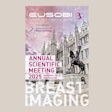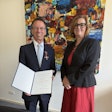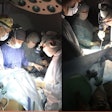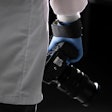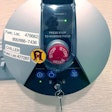Until recently, I had no real idea what a diphthong was. I had the vague notion it was some form of sprocket or perhaps part of an internal combustion engine. You see, Dear Reader, I didn’t have a classical education. When I was at school, “Grammar” was what we called my mother’s mother. I’m therefore a self-taught writer, almost entirely lacking any technical knowledge of English literature. Writing in the vernacular is all I have. But it worked for Hemingway and Vonnegut, so it’s good enough for me.
Anyway, my knowledge of grammatical arcana has had an upgrade. When looking up the correct medical spelling of “fetus/foetus,” I spent a happy hour or two down a rather deep internet rabbit hole, bouncing around related topics, completely divorced from reality. As it turns out, there is an accepted spelling of the term in British medical practice -- and that is “fetus.”
 Dr. Paul McCoubrie.
Dr. Paul McCoubrie.
As I was brought up spelling it “foetus,” this was a minor shock. Unbeknownst to this adult radiologist, it has officially been “fetus” for over a decade, not just on this side of the Atlantic but globally so. Our American cousins may celebrate this as a win, thinking the Brits have come to their senses and started using the simpler American spelling. But it isn’t quite the win they might think it is.
It is simply that fetus is closest to the original Latin word fētus (meaning breeding or birth). But why did foetus ever arise in the first place? Therein lies the entrance to the aforementioned rabbit hole. You see, during the 16th Century, a whole language of English medical words derived from Latin and Greek came into use to describe new medical discoveries. It wasn’t an intellectual flex, just that they were the scholastic languages of the time. As a result, a large number of words were introduced that were supposed to retain some of the grammatical features of their respective sources.
Except translators often hypercorrected matters, introducing prestigious spelling based on etymological fallacies. This led to multiple different spellings of fetus, foetus, phoetus, and fætus before finally agreeing on foetus. But they settled on the wrong spelling. The original Latin fētus was pronounced with a long ‘e’, denoted by the little line above the letter (called a “macron”). So fetus should really have been spelled “feetus” if we are going to be utterly logical about it. But it is a bit late for that now.
The “oe” bit in the middle of foetus is supposed to be, I learned, a diphthong. This is where two letters create a syllable that glides across the mouth. The exclamation “Ah!” is a monophthong, whereas “Ow!” is a diphthong. Perhaps the original thinking was, presumably, that “foetus” should have been pronounced “foe-ee-tus.” Whereas it was always pronounced “fee-tus.” So the diphthong argument for the “oe” in foetus doesn’t stand up.
Also, the “oe” bit is a digraph. This is where two letters combine to form a sound, potentially unrelated to the spelling. The digraph “oe” usually denotes a long flat “o” such as in “toe” or “poet.” Fetus was never pronounced “fow-tus,” so justifying foetus as a digraph doesn’t hold water either. The same is true with the words “fetor” and “fetid,” from the Latin fētor, meaning “stinking.” We Brits should have never used “foetor” or “foetid,” and it has been largely dropped. Feetor, anyone?
I began to wonder about all the other different spellings between British and American medical English. Were haematology/hematology, hydrocoele/hydrocele, tumour/tumor all originally misspelled by scientists of the Enlightenment? Well, no, as it turned out. It is more complex than just dropping redundant diphthongs and ignoring etymology.
I’ve read many arguments that British medical spelling is more accurate because it reflects the etymology of the word. Hence “oesophagus” should retain its initial “o” because the original Greek word was οἰσοφάγος or oisophagos. But we don’t call Egypt “Aegypt” just because the Greeks and Romans spelled it with an “A.” I’ve also read that we should retain the digraphs “oe” and “ae” as they are pronounced subtly differently than “e.” Well, that might once have been true, but not now.
American medical English has a degree of cultural dominance, largely because it is slightly simpler. A number of publishers (including this dear website) made the decision to use American medical English spellings for this reason and global uniformity. However, some groups, including the ESR, stuck with British medical English. There are other dialects, each with slightly different spellings. Commonwealth English is based on British English, used throughout the former British Empire. The Canadians have their own version -- neither American nor British.
The ESR’s decision to use British English was made way before current politics made all things American singularly unattractive. If the current U.S. shenanigans continue, will we see a further cultural backlash? I wouldn’t be surprised if their once-friendly neighbors started adopting redundant diphthongs. Might we see a rebranded Caenadiaen Assoeciation of Raediologists?
Medical English changes constantly and randomly to reflect modern use. We’ve never had the equivalent of Académie Française, the 400-year-old French institution solely dedicated to regulating French grammar, spelling, and literature. English has a 1600-year history from its roots as a West Germanic language spoken by Anglo-Saxon invaders. It then absorbed many words from others, largely Norse and French invaders. This mishmash of odd words gives a richness and depth, but its loose grammar structure allows flexibility and ease of use.
There are many changes to medical English that are quite deliberate. We remove eponyms when we learn that the individual whom the disease was named after turns out to have been a war criminal. We stop using language that stigmatizes or offends -- including, paradoxically, the word “stigmata,” which medics misuse to describe a visible sign of disease, whereas it actually means “mark of disgrace.”
Sometimes this is because of the actions of specialists coming together. Haematuria, across the globe, is now either officially visible or non-visible. It is no longer frank, microscopic, dipstick, gross, or anything else. This is because urologists wanted uniformity of terminology across the globe. Similarly, the names of pharmaceuticals have been standardized globally for similar reasons.
But should we look for uniformity in medical English across the globe? Should it be haematuria or hematuria? First used as haematuria in 1811, it is formed from the Greek words for “blood” (αἷμα haima) and “urine” (οὖρον ouron). Americans started using hematuria in the 1920s as they fell out of love with diphthongs, a process started by Webster in the 1820s.
There are those who would wholesale change most medical words, revising and simplifying the whole medical dictionary. Personally, I’m against it. If we start changing the spelling of British English words to match modern global pronunciation, we’d be absolutely screwed. For example, the sentence “Worcester knight Colonel Geoff sliced the tough sugar cake using a sword” makes complete sense to Brits. But if you change it to “Wuster nite Kernel Jeff slysed thu tuff shugar cayk yoosing ay sord,” it makes sense phonetically, but it becomes absolute gobbledygook.
I love the messiness of British English. I love its weird etymology. I love its odd spellings and pronunciation. People who want to change things should direct their energies elsewhere. Find a cure for haematuria/hematuria rather than squabbling over spellings. Let us celebrate our differences and work together rather than fighting over cultural hegemony.
Dr. Paul McCoubrie is a consultant radiologist at Southmead Hospital in Bristol, U.K. Competing interests: None declared.
His latest book -- More Rules of Radiology -- is available via its publisher Springer and also local bookstores ( ISBN-13 978-3031640933).
The comments and observations expressed herein do not necessarily reflect the opinions of AuntMinnieEurope.com, nor should they be construed as an endorsement or admonishment of any particular vendor, analyst, industry consultant, or consulting group.









